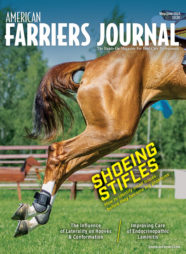One of the issues with sport horses that Dave Farley sees, especially among younger farriers, is a lack of knowledge about the differences between each disciplines. Much of this rests with understanding what the job is for each horse, he told attendees of the Cornell Farrier Conference in November 2014.

"On the circuit, we'll see people who are from isolated areas that get the best farrier possible," says the Coshocton, Ohio, and Wellington, Fla. farrier. "They bring a good hunter to compete, but it is hung up with steel like a field hunter. We get a lot of horses that are nicely shod, but maybe not as a show hunter, as it should be, but as a field hunter or fox hunter. It isn't intentional, because those farriers were thinking they were doing the right thing.
"These horses are trained specifically for their job, they often compete in different footing and there are several level of competition. The higher the level, I find the more pressure on the farrier."
Often, this is due to a lack of communication. He says it can be as simple as the owner or trainer may call the prospective farrier asking if he or she shoes hunters. But that question didn't get far enough into the issue. This can often result in a failure to recognize the most basic of differences, such as the environments and conditions in which these horses work.
"Did they tell you that the horse is a fox hunter? Maybe not," he says. "They may not know the difference either. It is what they've done their entire life."
Understanding the subtle differences is key adds Farley. They may seem small, but can make the difference for a horse. He recalled a conversation with legendary trainer George Morris about watching videos of high-end sport horses.
"Those are the tiny changes the farrier needs to make in the shoeing - always unseen, no promoted, but make the difference in their career and life," says Morris.
Education is essential. Farley says attend the shows and learn what the horses do. Engage the owners, whether they are amateur or professionals. Demonstrate that you are interested in the horse's job. And, when you have learned enough, increase your value to amateur owners by educating them about the differences.
Farley adds that you should support the discipline associations that you work for.
"I'm still a member of the American Quarter Horse Association, and I only shoe a couple of reiners for the Olympics," he says.







Post a comment
Report Abusive Comment